|
|
|
Sort Order |
|
|
|
Items / Page
|
|
|
|
|
|
|
| Srl | Item |
| 1 |
ID:
086914
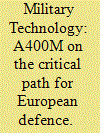

|
|
|
|
|
| Publication |
2009.
|
| Summary/Abstract |
On 10 February 2009, the French Senate unveiled a detailed report of the A400M programme,prepared on behalf of its Finance, Foreign Affairs and Defence Committees by Senators Jeanpierre Masseret and Jacques Gautier.
|
|
|
|
|
|
|
|
|
|
|
|
|
|
|
|
| 2 |
ID:
178418
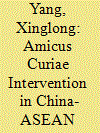

|
|
|
|
|
| Summary/Abstract |
One main criticism levelled against the investor-state dispute settlement system (ISDS) is the existence of limited opportunities for amicus intervention. Against this backdrop, this article firstly studies what reforms regarding amicus intervention in ISDS proceedings have been put forward by China and ASEAN countries and the relevant dilemmas. Subsequently, to ensure that maximum benefits can be realised from amicus participation in ISDS proceedings in China-ASEAN Free Trade Area (CAFTA), this article proposes procedures for when and how an amicus may participate in arbitral proceedings under the upcoming investment agreements, particularly the Regional Comprehensive Economic Partnership (RCEP). Additionally, given the fact that the level of amicus participation in ISDS proceedings is still limited, the article suggests that China and ASEAN need to establish safeguards to provide amici with access to key arbitral documents and oral hearings. However, achieving the above objectives should not come at the expense of undermining the confidential and protected information of both disputing parties.
|
|
|
|
|
|
|
|
|
|
|
|
|
|
|
|
| 3 |
ID:
150183
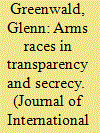

|
|
|
| 4 |
ID:
150939
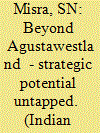

|
|
|
| 5 |
ID:
188865
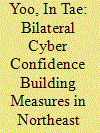

|
|
|
|
|
| Summary/Abstract |
Under what conditions do countries form confidence building measures (CBMs)
in the cyber domain? How do those conditions affect the frequency and type of
cyber CBMs (CCBMs)? The extant literature surveys existing CCBMs, providing
fragmented pictures of them at either the global, regional, or bilateral levels.
Thus, there is a lack of systematically comparative perspectives between multiple
efforts for states’ cyber confidence–building. This deficiency implies that little
to no research has been dedicated to analytical examinations of the development
of CCBMs. The present article offers a framework to assess the development
and theoretical arguments to understand its underlying causes. It argues that the
willingness of political leaders affected by the international strategic–security
context is a necessary condition, in addition to the cost-benefit calculation of
policymakers, affecting the frequency and type of CCBMs. To examine the
arguments, the present article overviews the global development of the discussion
of CCBMs at the UNGGE and OEWG. Then it presents the networks of CCBMs
in Northeast Asia where the staunchest alliances as well as fierce strategic–security
competitions have taken hold in the emergence of the new cyber domain. Lastly,
the article investigates the processes of bilateral CCBMs formation in three dyads
between the United States and each of three states, namely, Russia, China, and
Japan. The empirical findings support the theoretical arguments
|
|
|
|
|
|
|
|
|
|
|
|
|
|
|
|
| 6 |
ID:
072589
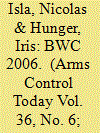

|
|
|
| 7 |
ID:
150942
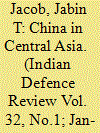

|
|
|
| 8 |
ID:
138092
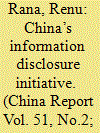

|
|
|
|
|
| Summary/Abstract |
This article examines the initiatives taken by the government of the People’s Republic of China towards ensuring government information transparency. The Open Government Information Regulations (OGI) which was adopted in 2007 is a landmark in the transparency reforms process in China. The analysis of this initiative and further reforms becomes vital as China has witnessed newly emerged emphasis on anti-corruption campaign and rule of law. Though these regulations were adopted in 2007 at national level, many reforms have been introduced in these regulations in terms of annual guidelines from time to time. This article analyses the origin and development of OGI; the scope of these regulations; the legal, political and structural problems obstructing the successful implementation of these regulations; and further reforms towards making China more open and transparent. This work also provides a comparative analysis of information disclosure initiatives in China and India.
|
|
|
|
|
|
|
|
|
|
|
|
|
|
|
|
| 9 |
ID:
077941
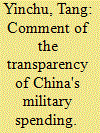

|
|
|
| 10 |
ID:
140858
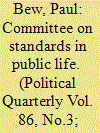

|
|
|
|
|
| Summary/Abstract |
In his recent memoir, William Waldegrave wrote that no country run by John Major and Robin Butler was likely to be in much danger of systemic corruption. The fact remains that a quarter of a century ago, John Major, with the guidance and support of his cabinet secretary, decided to establish the Committee on Standards in Public Life under the chairmanship of Lord Nolan. The apparent prevalence of ‘sleaze’ issues in public life—most notably the ‘cash for questions’ scandals involving Tory MPs—provoked the decision. Lord Nolan's committee immediately enunciated seven principles of public life: honesty, accountability, integrity, selflessness, openness, opportunity and leadership. Over the years, many of the Committee's recommendations have been accepted. There is today vastly greater transparency. The principles have been widely accepted; it is clear the public expects that they should be observed by public servants, including, perhaps especially, MPs. Yet it is equally clear that there is a widespread and still deepening mood of public cynicism on standards matters. The Committee is determined to defend the Nolan principles, but without more help from the political class it will be like Mrs Nupkins in The Pickwick Papers: inculcating moral lessons of great importance and generally ignored.
|
|
|
|
|
|
|
|
|
|
|
|
|
|
|
|
| 11 |
ID:
191309
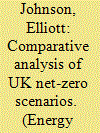

|
|
|
|
|
| Summary/Abstract |
Final energy demand in the UK has remained relatively constant since the 1970s. However, most of the scenarios that model pathways to achieve the UK's net-zero greenhouse gas emissions by 2050 indicate that energy demand reduction (EDR) will be an important pillar of climate change mitigation. Despite this, the UK Government has no clearly defined strategy to reduce demand. This comparative analysis explores the role of EDR across twelve UK-based climate scenarios from four organisations that estimate changes in carbon emission and energy consumption from 2020 to 2050. We focus on changes in final demand across the economy, assessing the scale of ambition and the implications for the rest of the energy system in the context of net-zero. All the pathways explored achieve reductions of at least 32.8% in total final energy demand from 2020 to 2050, suggesting that this is the minimum level of demand reduction required to achieve the development and rollout of the supply side technologies necessary to decarbonise the energy system. Reductions in total final demand of up to 52% are demonstrated. We find that pathways with higher levels of EDR mitigate against technological challenges, such as scaling up renewable energy capacities, are less reliant on carbon-dioxide removal technologies and require less investment – but are characterised by higher levels of social change.
|
|
|
|
|
|
|
|
|
|
|
|
|
|
|
|
| 12 |
ID:
109038
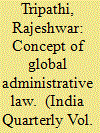

|
|
|
|
|
| Publication |
2011.
|
| Summary/Abstract |
Globalisation, which has integrated the whole world into a unit by a vast range of regulatory regime, has led to the emergence of a global state through international institutions. These institutions regulate the social, economic and political life of states. Therefore it has led to the emergence of the concept of Global Governance. This concept of Global Governance has led to development of the concept of Global Administrative Law (GAL). This GAL concept is based on the idea of understanding global governance as administration, which can be organised and shaped by principles of an administrative law character. In this way GAL is related to trans-governmental regulation and administration designed to address the consequences of globalised interdependence in such fields as security, trade conditions on development and financial assistance, banking and financial regulations, Intellectual Property Rights, Labour standards and cross-border movements of populations, including refugees. Isolated national regulations cannot govern these different areas and administrative measures and therefore various transnational systems of regulation or regulatory co-operation have been established through international treaties and organisations. To implement these regulations, transnational administrative bodies-including international organisations and informal groups of officials that perform administrative functions, are established. However these institutions are not directly subject to control by national governments or domestic legal systems or, in the case of treaty-based regimes, the states party to the treaty. However their regulatory decisions may be implemented directly against private parties by the global regime or more commonly through implementing measures at the national level. This situation has led to the question of accountability, fairness and transparency and due process in the functioning of these bodies. GAL is developed in response to this question, which attempts to extend the application of domestic administrative law to intergovernmental regulatory decisions that affect a nation.
|
|
|
|
|
|
|
|
|
|
|
|
|
|
|
|
| 13 |
ID:
144469
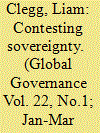

|
|
|
|
|
| Summary/Abstract |
There is a battle over military expenditure at the International Monetary Fund, with consistent pressure from its most powerful member for the Fund to get tough on military expenditure being pitted against lowerorder states' invocation of the organization's sovereignty-protecting rules and practices. While the formal victory of the lower-order states has been codified in the Fund's relatively weak Guidelines on Military Expenditure, on a case-by-case basis policy shifts continue to be imposed on borrowers through the application of informal influence by the US Executive Director in the IMF boardroom. By integrating insights from literature exploring the tension between formal rules and informal practices in international organizations, this case study extends the understanding offered in the international relations literature of the foundations of sovereign inequality in international politics.
|
|
|
|
|
|
|
|
|
|
|
|
|
|
|
|
| 14 |
ID:
188388
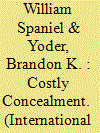

|
|
|
|
|
| Summary/Abstract |
This article presents a formal model that shows how states can credibly reassure each other simply by maintaining a cooperative outward narrative. The reassurance literature to date has focused largely on costly signaling, whereby benign states must distinguish themselves by taking specific actions that hostile types would not. The mere lack of overtly expressed hostility without costly signals has been considered “cheap talk,” on the assumption that this behavior is costless for hostile states and thus uninformative. In contrast, this paper argues that maintaining a cooperative façade while secretly formulating and executing exploitative policies carries inherent trade-offs, and thus constitutes a credible reassurance signal. Foreign policy planning and implementation requires communication among various individuals, groups, and organizations, which has some probability of being observed and punished by outside actors. Yet efforts to conceal the policymaking process and reduce this probability are costly—they require investments in internal monitoring and restrictions on internal communication that can substantially degrade policy outcomes. Thus, to the extent that a state's foreign policymaking process is transparent—that is, that concealing internal communications is difficult—the absence of positive signals of hostility is a credible signal of its benign intentions. The argument is illustrated with a case study of German reassurance signals during the July Crisis preceding World War I.
|
|
|
|
|
|
|
|
|
|
|
|
|
|
|
|
| 15 |
ID:
132721


|
|
|
|
|
| Publication |
2014.
|
| Summary/Abstract |
space systems play an important role in sustaining the development, prosperity and security of many nations. As more nations become critically reliant on space systems, questions of maintaining safety and strategic stability in outer space have come to the fore. Transparency and Confidence-Building Measures (TCBMs) for outer space activities have an important role to play in providing clarity about the intentions of States and in articulating norms of behaviour in outer space. TCBMs take several forms. They may be the elaboration of basic principles related to the exploration and use of outer space, political measures related to establishing norms of conduct, information-sharing activities to improve the transparency of outer space activities, operational practices which demonstrate a commitment to mutual cooperation in outer space, or consultative mechanisms. We present an analytical framework for evaluating potential TCBMs and illustrate the application of this framework to examples of potential operational, regulatory, treaty-based and declaratory TCBMs.
|
|
|
|
|
|
|
|
|
|
|
|
|
|
|
|
| 16 |
ID:
152071
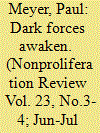

|
|
|
|
|
| Summary/Abstract |
International cooperation on outer-space security has fluctuated over the past decades, marked by periods of common endeavor and relative stability as well as times of destabilizing developments and rising tensions. A high-water mark of space-security diplomacy was the 2013 UN Group of Governmental Experts consensus report on “Transparency and Confidence-Building Measures in Outer Space Activities,” which set out a rich menu of measures and promised new levels of cooperative security among states. Regrettably, the report was followed by a series of negative developments that threaten to reverse the cooperative trend it espoused. These developments include the introduction (by Russia and China) and rejection (by the United States) of a revised draft treaty on the Prevention of Placement of Weapons in Outer Space (PPWT); the adoption by the UN General Assembly of a divisive resolution on “no first placement” of space weapons; the failure of the European Union to gain support for its proposed Code of Conduct, as well as escalating strategic tensions. This viewpoint analyzes the re-emergence of these “dark forces” and their implications for multilateral diplomacy and makes suggestions for remedial action to preserve outer-space security.
|
|
|
|
|
|
|
|
|
|
|
|
|
|
|
|
| 17 |
ID:
162860
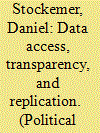

|
|
|
|
|
| Summary/Abstract |
Do researchers share their quantitative data and are the quantitative results that are published in political science journals replicable? We attempt to answer these questions by analyzing all articles published in the 2015 issues of three political behaviorist journals (i.e., Electoral Studies, Party Politics, and Journal of Elections, Public Opinion & Parties)—all of which did not have a binding data-sharing and replication policy as of 2015. We found that authors are still reluctant to share their data; only slightly more than half of the authors in these journals do so. For those who share their data, we mainly confirmed the initial results reported in the respective articles in roughly 70% of the times. Only roughly 5% of the articles yielded significantly different results from those reported in the publication. However, we also found that roughly 25% of the articles organized the data and/or code so poorly that replication was impossible.
|
|
|
|
|
|
|
|
|
|
|
|
|
|
|
|
| 18 |
ID:
131682
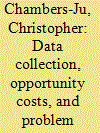

|
|
|
| 19 |
ID:
162774
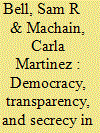

|
|
|
|
|
| Summary/Abstract |
Why is it that some democracies are able to effectively engage in secrecy and mobilize their forces privately, while others are unable to keep enough information secret to effectively carry out such an attack? Recent work by Colaresi (2014) suggests that a democracy's ability to keep information secret depends on its retrospective oversight institutions, which allow democracies to keep information secret in the present with the promise of revealing it to the public in the future. Though Colaresi (2014) finds that states with retrospective oversight have greater military spending, more support for military action, and more success in crises, to our knowledge there has yet to be empirical support for the argument that democracies with greater retrospective oversight can actually conduct foreign policy with greater opacity than those without retrospective oversight. In this research note we empirically explore this question, using data on private mobilizations by democracies with varying levels of retrospective oversight. This gives us greater insight into strategic military choices and shows how military effectiveness can be affected by political institutions.
|
|
|
|
|
|
|
|
|
|
|
|
|
|
|
|
| 20 |
ID:
166144


|
|
|
|
|
| Summary/Abstract |
Little attention has been given to understanding how international courts feature in legitimacy assessments. How should the performance of international courts be evaluated in terms of their effect on a democratic deficit in international lawmaking? This article takes an initial step toward understanding how international courts improve or weaken the presence of democratic values in international lawmaking. In particular, this article focuses on one aspect of international courts—access for transnational actors. This article argues that TNA access to international courts provides an institutional mechanism to advance participation and transparency in international lawmaking. Normative and empirical analysis are combined to illustrate the extent to which access applies to international courts. Based on the empirical findings, which show a marked increase in TNA access to international courts, I argue that the increased participation and transparency made available through TNA access have democratizing effects on international lawmaking.
|
|
|
|
|
|
|
|
|
|
|
|
|
|
|
|
|
|
|
|
|